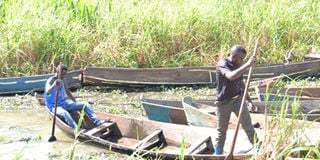Districts renew call to license fishing

Revenue source. Fishermen at Lwampanga Landing Site in Nakasongola District at the weekend. PHOTO BY DAN WANDERA
What you need to know:
- Partnership. They say government cannot effectively monitor the fisheries licensing system without involving them.
Nakasongola. The 15 districts sharing Lake Kyoga have renewed calls demanding government decentralise fish licensing in the area to boost local revenue.
The districts under their umbrella Lake Kyoga Integrated Management Organisation (Lakimo) claim that their petition handed to the Minister of Agriculture, Mr Vincent Ssempijja, last year over the matter has not been effected.
“For the last six years, government has lost revenue because all the fishing activity on Lake Kyoga is not licensed. We believe government has no capacity to monitor the fisheries licensing system without direct involvement of districts,” Mr Sam Kigula, the Lakimo chairperson, said at the weekend.
“A lot of revenue is lost because we have no mandate to issue the fishing licences yet we continue registering cases of commercial fishing activity on the lake,” Mr Kigula, also the Nakasongola District chairperson, added.
Affected districts
The organisation comprises Nakasongola, Pallisa, Amolatar, Kamuli, Apac, Dokolo, Buyende, Kaliro, Soroti, Kaberamaido, Serere, Katakwi, Ngora, Dokolo and Kumi districts.
Mr Kigula said although Nakasongola has more than 10 fishing landing sites, there could be more groups and individuals in the industry who should be remitting revenue to districts but are not captured.
“This is the same problem in all the member districts,” he said.
The organisation also asked government for multi-billion fish handling facilities which were not completed by the respective contractors under a World Bank-funded project.
The districts also want transport facilitation to effectively survey Lake Kyoga.
“We are currently mobilising resources to have the annual general meeting for Lakimo scheduled for mid-April, but there is fear that we are unlikely to discuss the same issues because government has been slow in responding to the different concerns raised at the past annual general meeting,” Mr Kigula said.
When contacted, Mr Solomon Kalema, the senior spokesperson of the Ministry of Agriculture, attributed the delay in enforcing the fish licencing programme to illegal fishing, which he said has partly compromised the normal fishing activity.
“We believe that after the UPDF intervention under the Fisheries Protection Unit (FPU), government will steadily make the planned interventions, including the restocking of the lake. The ministry could not start issuing licences for fishing activities on a lake which had been invaded by unscrupulous fishermen,” he said.
Mr Kalema said licensing of boats is already underway in areas where illegal fishing has been wiped out, especially parts of Lake Victoria.
“The rejuvenation of the fish stock in all lake waters will brighten the future of the fisheries industry that was under threat from illegal fishing activities,” he added.
When contacted, Lt Col James Nuwagaba, the commandant of FPU, declined to comment on the UPDF operations against illegal fishing on Lake Kyoga.
“We do not do our operations through the media. The politicians have talked a lot about the activities on the lake. They even comment on matters that are beyond their capacity and ability,” Lt Col Nuwagaba said before hanging up.
Earlier, district officials and the Nakasongola MPs asked government for more manpower to fight illegal fishing on Lake Kyoga.
“We have been complaining to government over the method of deploying a few soldiers to hunt down illegal fishermen who have already destroyed the fisheries resources instead of entering the waters to avert the destruction. We believe the recent pass out of more soldiers to boost the fisheries enforcement teams will create a big impact,” Mr Noah Mutebi, the Nakasongola County MP, said last week.
In January 2017, President Museveni established FPU to crackdown on illegal fishing in the country.
However, it has on several occasions been criticised over their high-handedness in dealing with people suspected of engaging in illegal fishing.
Many people suspected of dealing in immature fish have been arrested and several ungazetted landing sites destroyed on the shores of Lake Victoria, Kyoga and Albert.
FISH STOCK
Illegal fishing has caused a reduction in fish stocks, especially in species such as tilapia, Nile perch and sliver fish thus affecting the country’s export earnings. According to Ministry of Agriculture’s records, Uganda has a fish capture potential of 750,000 tonnes annually. The current production is at 461,000 tonnes and 100,000 tonnes from aquaculture. There are 250 species of fish in the country’s major lakes of Victoria, Kyoga, Albert, George, Edward and more than 160 minor lakes.



